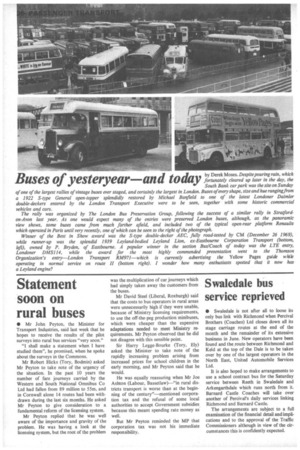Statement soon on rural buses
Page 34

If you've noticed an error in this article please click here to report it so we can fix it.
• Mr John Peyton, the Minister for Transport Industries, said last week that he hopes to receive the results of the pilot surveys into rural bus services "very soon."
"1 shall make a statement when I have studied them", he promised, when he spoke about the surveys in the Commons.
Mr Robert Hicks (Tory, Bodmin) asked Mr Peyton to take note of the urgency of the situation. In the past 10 years the number of fare journeys carried by the Western and South National Omnibus Co Ltd had fallen from 89 million to 55m, and in Cornwall alone 14 routes had been withdrawn during the last six months. He asked Mr Peyton to give consideration to a fundamental reform of the licensing system.
Mr Peyton replied that he was well aware of the importance and gravity of the problem. He was having a look at the licensing system, but the root of the problem was the multiplication of car journeys which had simply taken away the customers from the buses.
Mr David Steel (Liberal, Roxburgh) said that the costs to bus operators in rural areas were unnecessarily high if they were unable, because of Ministry licensing requirements, to use the off-the-peg production minibuses, which were cheaper than the expensive adaptations needed to meet Ministry requirements. Mr Peyton observed that he did not disagree with this sensible point.
Sir Harry Legge-Bourke (Tory, Ely) asked the Minister to take note of the rapidly increasing problem arising from increased prices for school children in the early morning, and Mr Peyton said that he would.
He was equally reassuring when Mr Joe Ashton (Labour, Bassetlaw)—"in rural dis tricts transport is worse than at the begin ning of the century"—mentioned corporation tax and the refusal of some local
authorities to accept Government subsidies. because this meant spending rate money as well.
But Mr Peyton reminded the MP that corporation tax was not his immediate responsibility.










































































































